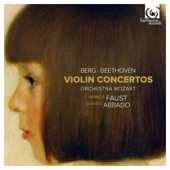
ESSENTIAL RECORDINGS

Have you ever noticed how many composers of violin concertos had names
that begin with B? There were the "three Bs": Bach, Beethoven and
Brahms, but other well-known composers in the genre include Bruch (3),
Bartok (2), Britten, Barber and Berg. Of course there were other
composers who had a go at the genre, fellows like Mozart and Mendelssohn
for example, but you can fill a respectable number of CDs with
B-composer concertos for violin. On this disc Isabelle Faust presents
those of Alban Berg and Beethoven. Both are undoubted masterpieces, though of
dissimilar moods. The Beethoven is redolent of the composer's
middle-period optimism while the Berg is elegiac and more introspective.
Indeed it is hard to think of another violin concerto with such depth of
feeling, though the Britten comes close.
The emotions in the Berg are profound and do not need to be worn on the
performers' sleeves. Although violinist Faust and conductor Abbado give
the romantic elements in the score due attention, they avoid the
temptation to ham it up as one occasionally hears. The performance is
excellent in every respect and would make a good first choice for
someone wishing to get acquainted with the work, but its philosophical
orientation is more or less standard. There's nothing wrong with that.
When we get to the Beethoven, things are a little more complicated.
Once again the quality of playing is beyond reproach. The things that
set this recording apart may strike some listeners as a little quirky,
but its sense of adventure cannot be faulted. Beethoven arranged the
concerto for piano and orchestra and while the arrangement is almost
never performed nowadays, Faust and her colleagues have harvested a few
ideas, most notably in the cadenzas. Although the composer did not
provide cadenzas for the original score, he did for the piano version,
and in this recording they are sort of reverse-engineered for the
violin. Itís both a shock and a relief not to hear the familiar
(admittedly magnificent) Kreisler cadenza for the first movement.
Whether one would like to hear this one more than a few times is a
matter of individual taste. Another thing that sets this recording apart
from others of the concerto is the unusually brisk tempo of the third
movement. It can take a moment or two to get used to and diminishes the
sunniness that we hear in most performances, but it works on its own
terms.
Richard Todd - March 2012